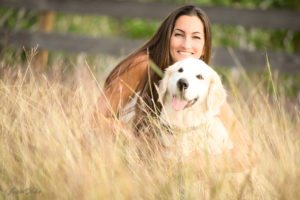 Certified Service Dog Coach Rebecca Corso, MSc, has degrees in zoology, and wildlife and fisheries science, as well as a CPDT-KA, CBCC-KA and a CDBC. Her business, Your Pro Dog Trainer in Visalia, California, offers in-home dog training and board and train, as well helping people train their own dogs as service dogs. She employs a team of four professional dog trainers. Rebecca and her husband also founded a non-profit service dog program, California Service Dog Academy.
Certified Service Dog Coach Rebecca Corso, MSc, has degrees in zoology, and wildlife and fisheries science, as well as a CPDT-KA, CBCC-KA and a CDBC. Her business, Your Pro Dog Trainer in Visalia, California, offers in-home dog training and board and train, as well helping people train their own dogs as service dogs. She employs a team of four professional dog trainers. Rebecca and her husband also founded a non-profit service dog program, California Service Dog Academy.
Can you tell us a bit about your training background and transition to working with service dogs?
I have been very fortunate to have quite a few adventures around the world involving all sorts of amazing animals. I have worked successfully as a wildlife biologist, a zookeeper, a zoo curator and a wildlife rehabilitator.
Although I started with zoo animals, dogs have always been my favorite. I started therapy dog work with Riley, my golden retriever, many years ago, and co-founded a therapy dog group in Pietermaritzburg, South Africa.
About ten years ago, I heard about using detection dogs in wildlife conservation. I threw myself into learning more about detection dogs, eventually starting a non-profit called Dogs for Conservation. Over the years I have trained dogs to search for endangered toads in Texas, invasive snails in the Galapagos Islands, and bird carcasses in the Mojave Desert.
Around 2016, I started Your Pro Dog Trainer, offering dog training and behavior consulting to the Central Valley of California. Almost immediately we started getting inquiries about service dog training. Initially, I did not feel comfortable taking on those clients, so I referred them out. I started learning more and became more comfortable taking on certain service dog clients, depending on their needs. The successes I had with those initial clients boosted my confidence just as the demand for this service was growing.
Tell us about California Service Dog Academy.
My husband and I founded a non-profit, California Service Dog Academy (CSDA) in 2017. In 2018 we were fortunate enough to raise significant funding earmarked to support veterans in need of service dogs. We are able to provide trained dogs to approved veterans at no cost.
We have partnered with a local organization, A Combat Veteran’s Hope (ACVH), whose mantra is “Welcome Home.” ACVH helps us recruit new applicants and screen them, and continues to offer support as needed once a dog is placed.
CSDA is committed to using positive reinforcement training methods for both our canine and human students. We firmly believe it is the best way to train dogs, and believe positive reinforcement is a vital part of the therapeutic process for our clients. With many of our clients dealing with PTSD, teaching them to proactively look for what their dog is doing “right” rather than reacting to something that’s “wrong” is a huge paradigm shift that has ripple effects into the rest of their lives.
Has offering service dog training had an impact on your for-profit dog training business, Your Pro Dog Trainer?
Being able to offer service dog training has definitely impacted my for-profit business in a positive way. We get a lot of service dog clients, of course, but I also feel like our work training service dogs allows people to trust us more with their pet dogs.
Why did you enroll in the SDC course?
Although I have a solid background in the animal field, I did not have a lot of early experience training service dogs. I had heard great things about Veronica and the SDC course, and decided it was the best option for me to grow and legitimize the services I was offering.
The SDC course was all-encompassing, from the law to the dog to the client. There was, rightly so, a lot of emphasis on how people with disabilities live with their disabilities, and the public access challenges they may face. I felt like the projects within each module were great exercises to help expand my horizons and understand what my clients may be facing.
What advice would you give to trainers thinking about starting a non-profit service dog program?
Starting a non-profit is a labor of love. I work seven days a week right now, and many days I spend more time at my desk than training a dog. I would encourage anyone interested in starting their own non-profit to do plenty of research, network as much as you can, and make sure you have the time and the financial support to put into your new venture. Non-profits are businesses, and should be treated as such.
What has surprised you about working with service dogs?
Our work with veterans has probably been one of the most intense emotional roller coasters I have been on. I’m not sure anything could have prepared me for the impact they have had on me. Of course, the dogs never cease to amaze me in what they are capable of and how they can help people.
